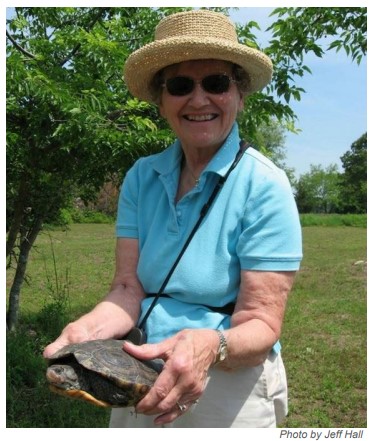Charlotte Sornborger Wins 2020 NEPARC Community Conservation Award.
NEPARC
2020 NEPARC Community Conservation Award Winner!
This Award is presented by Northeast Partners in Amphibian and Reptile Conservation (NEPARC) to recognize an individual who has made a considerable contribution(s) to the conservation of amphibians and reptiles in a particular state or geographical area in the NEPARC region. The award recognizes someone who works with partners to advance herpetofaunal conservation efforts at a state- or local-level where achievements have contributed to preventing the loss of species or their habitats or has educated others to further the NEPARC mission.

Thirty-one years ago, Charlotte Sornborger initiated a grass roots conservation effort to protect what was, at the time, the only known diamondback terrapin nesting site in Rhode Island. She spurred the Town of Barrington to establish a refuge and for 30 years led a team of volunteers to monitor nesting females (>250 nests per year) and emerging hatchlings and protect nests from predators. To foster education on conservation of terrapins in the community and beyond, she has given countless public lectures, led tours at the site, presented at academic meetings, and contributed to scientific working groups.
Charlotte has the ability to align groups with different goals and convince them to commit time, energy, and funding toward conservation of diamondback terrapins. Charlotte is kind, exceedingly humble, and unflappable; these personality traits disarm people who may have different land use priorities.
From 1986-2005, Charlotte served as President of the Barrington Land Conservation Trust (BLCT). With Charlotte at the helm, the BLCT acquired over 100 acres in the Town of Barrington. She worked deftly with the Barrington Town Council and the RI Department of Environmental Management (RIDEM) to usher these lands into protective status, thus protecting amphibian and reptile habitats. With the BLCT, and the assistance of the Barrington Town Council and RIDEM, she worked to establish the 75-acre conservation easement that protects the Barrington terrapin nesting site.
Through her efforts to educate the public about terrapin conservation, Charlotte developed partnerships with the University of Rhode Island, Rhode Island College, Wheaton College, and many local elementary and high schools. She sought out high school interns each year to participate in the mark-recapture study and trained college students in research methods for terrapins.
In 2019 at 82 years old, Charlotte ‘retired’ from day-to-day leadership of the terrapin project and serves now in an advisory role. Her tireless efforts over 30 years served to bridge numerous governmental agencies, conservation organizations, and members of the public, which serve as a model for building consensus and support that clearly has led to conservation of the diamondback terrapin in Rhode Island.
Charlotte’s dogged efforts for 30 years led to a sea-change in awareness and on-the ground conservation efforts for the diamondback terrapin in Rhode Island by her seamless management of three conservation tenets: education, research, and habitat protection. She engaged the public, schools, and government officials, significantly increasing understanding of the diamondback terrapin and the importance of protecting its habitats. She initiated and coordinated one of the most active terrapin research programs in New England. This research program, now in its 31st year, includes a mark-recapture study of nesting adult females, establishing nest enclosures to increase reproductive success, and monitoring hatchlings. Most importantly, without Charlotte’s leadership and tireless efforts, it is extremely likely that the most important of two remaining nesting sites for diamondback terrapins in Rhode Island would have been destroyed long ago.
